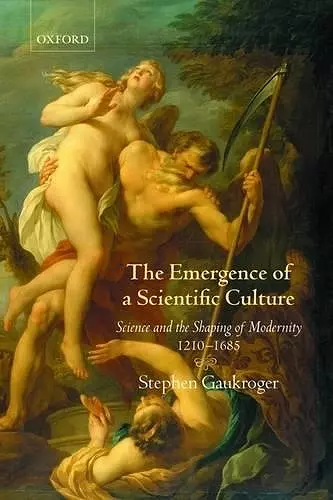The Emergence of a Scientific Culture
Science and the Shaping of Modernity 1210-1685
Format:Paperback
Publisher:Oxford University Press
Published:23rd Oct '08
Currently unavailable, and unfortunately no date known when it will be back
This paperback is available in another edition too:
- Hardback£112.50(9780199296446)

Why did science emerge in the West and how did scientific values come to be regarded as the yardstick for all other forms of knowledge? Stephen Gaukroger shows just how bitterly the cognitive and cultural standing of science was contested in its early development. Rejecting the traditional picture of secularization, he argues that science in the seventeenth century emerged not in opposition to religion but rather was in many respects driven by it. Moreover, science did not present a unified picture of nature but was an unstable field of different, often locally successful but just as often incompatible, programmes. To complicate matters, much depended on attempts to reshape the persona of the natural philosopher, and distinctive new notions of objectivity and impartiality were imported into natural philosophy, changing its character radically by redefining the qualities of its practitioners. The West's sense of itself, its relation to its past, and its sense of its future, have been profoundly altered since the seventeenth century, as cognitive values generally have gradually come to be shaped around scientific ones. Science has not merely brought a new set of such values to the task of understanding the world and our place in it, but rather has completely transformed the task, redefining the goals of enquiry. This distinctive feature of the development of a scientific culture in the West marks it out from other scientifically productive cultures. In The Emergence of a Scientific Culture, Stephen Gaukroger offers a detailed and comprehensive account of the formative stages of this development---and one which challenges the received wisdom that science was seen to be self-evidently the correct path to knowledge and that the benefits of science were immediately obvious to the disinterested observer.
Gaukroger's book is a historical reconstruction that brackets historical context (social, practical, political etc.) and offers a plethora of studies on intellectual history on a variety of subjects that deserve attention in any investigation of the emergence of the scientific culture of the West. * Wolfgang Lefèvre ISIS d *
The thesis of his substanial and impreesive book is that Christianity indeed played a major, not, as often proposed, through the dissociation of science from religious concerns, but through a reconstituted partnership between Christianity and (a reconstructed) natural philosophy...I am not aware of any other treatment of these themes that combines so magisterially a discerning account of changing boundaries between disciplines with a dispassionate analysis of the changing relations between theology and the sciences. The result is a scholarly exploration on a grand scale. * John Hedley Brooke British Journal for the History of Science *
Gaukroger's book is a historical context (social, practical, political, etc.) and offers a plethora of studies in intellectual history on a variety of subjects that deserve attention in any investigation of the emergence of the scientidic culture of the West. * Wolfgang Lefèvre ISIS *
This impressive and wide-ranging book is the first of a quintet devoted to the question: how in the (Western) world did all cognitive values come to be associated with scientific ones?... Gaukroger's grand beginning of an even grander five-volume narrative is an exceptional book. Its structure of scientific authority, as it were, is certain to stimulate long and lively discussions among academics of every stripe. * Michael H. Shank, Renaissance Quarterly *
[A] substantial and impressive book...I am not aware of any other treatment of these themes that combines so magisterially a discerning account of changing boundaries between disciplines with a dispassionate analysis of the changing relations between theology and the sciences. The result is a scholarly exploration on the grand scale. * John Hedley Brooke, British Journal for the History of Science *
- Winner of *Choice* Outstanding Academic Book 2007.
ISBN: 9780199550012
Dimensions: 234mm x 155mm x 30mm
Weight: 864g
576 pages